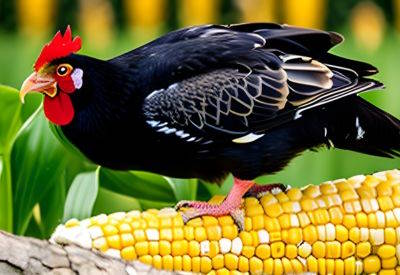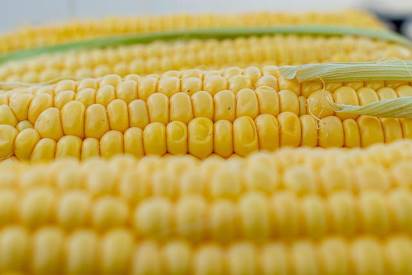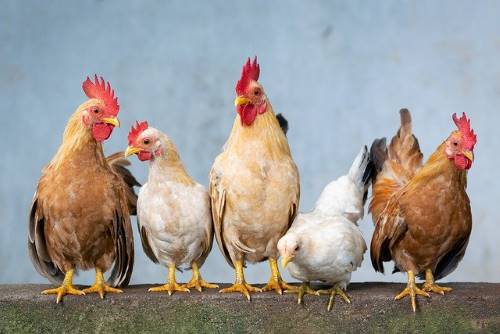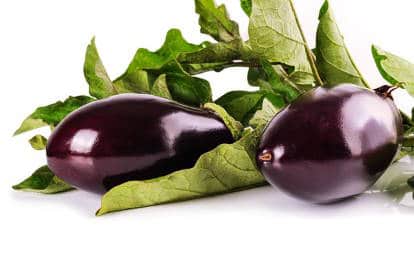As a fellow chicken owner and homesteader, I know how much joy it can bring to watch our feathered friends thrive and enjoy their environment. One of the most entertaining aspects of raising chickens is discovering the various treats they love to eat. While wandering through my garden, I noticed my chickens eyeing the corn on the cob growing nearby, and it got me wondering, can chickens eat corn on the cob?
This article will investigate whether chickens can safely enjoy corn on the cob as a tasty treat. We’ll also discuss the benefits of feeding corn on the cob to your flock, things to watch out for, how often it should be offered, and how to prepare it for your chickens. And for those of you with baby chicks, we’ll touch upon whether these little ones can also enjoy corn on the cob.
As someone who takes pride in providing the best care for my chickens, I understand the importance of maintaining a balanced diet and offering a variety of treats to keep them happy and healthy. So, let’s explore the world of corn on the cob and its place in our chickens’ lives together.

Can chickens eat corn on the cob?
So, can chickens eat corn on the cob? The short answer is yes. Chickens can enjoy corn on the cob as a tasty and healthy snack. Many chicken owners and farmers have found that their chickens love pecking at the corn kernels, effectively cleaning the cob to its core. It can be a fun and engaging activity for your flock, providing them with physical and mental stimulation. It’s also an easy-to-digest food, making it a suitable treat for chickens of all ages.
However, it’s essential to remember that corn on the cob should be fed as a treat or supplement rather than a primary food source. Chickens need a balanced diet to thrive, and their main feed should be specifically formulated for their nutritional needs. Now that we know chickens can eat corn on the cob let’s discuss some of this treat’s benefits.
[ChickenAffiliate]
The benefits of eating corn on the cob for chickens
In addition to being a fun activity, corn on the cob can provide chickens with essential nutrients, such as carbohydrates, proteins, and vitamins. Corn is an excellent energy source for chickens, helping them maintain their body heat, particularly during cold weather. Here are five benefits of feeding corn on the cob to your flock.
High energy content
Corn is rich in carbohydrates, giving chickens a quick energy boost. This helps keep their metabolism running smoothly and supports their daily activities, such as foraging and laying eggs.
Easy to digest
Corn is easily digestible for chickens, making it a suitable snack for all ages. It’s gentle on their digestive systems and less likely to cause digestive issues when fed in moderation.
Source of protein
While corn is not the highest protein source, it contains some essential amino acids that chickens need for muscle growth and egg production. However, it should not be relied upon as the primary source of protein.
Vitamins and minerals
Corn on the cob contains essential vitamins and minerals contributing to chicken health. These include vitamins A, B, and E and magnesium, potassium, and phosphorus.
Mental and physical stimulation
Pecking at corn on the cob can be a fun and engaging activity for chickens, providing them with mental and physical stimulation, which is essential for their well-being.
Things to watch out for when feeding corn on the cob to chickens

Although corn on the cob provides your chickens with many benefits, there are a few things to watch out for.
Mold and spoilage
Before feeding corn on the cob to your chickens, always check for signs of mold or spoilage. Moldy or spoiled corn can harm your flock, potentially leading to illness or death.
Feeding too much corn
Corn on the cob should be fed in moderation as a treat rather than a primary food source. Overfeeding corn can lead to obesity, other health problems, and an unbalanced diet.
Choking hazards
While it’s rare, chickens can choke on large corn kernels if they attempt to swallow them whole. Be mindful of this when feeding your chickens corn on the cob, and consider breaking the kernels into smaller pieces for smaller breeds.
How often should chickens eat corn on the cob?
Corn on the cob can be a delightful treat for your chickens, but feeding it in moderation is important. Generally, treats like corn on the cob should make up no more than 10% of a chicken’s diet. Feeding corn on the cob once or twice weekly is a good guideline.
Remember that chickens need a balanced diet to thrive, and their main feed should be specifically formulated for their nutritional needs. Providing too much corn can lead to an unbalanced diet and health issues, so be mindful of portion sizes when offering this tasty treat.
How to prepare corn on the cob for feeding to chickens

Feeding corn on the cob to your chickens is easy, and here’s how you do it.
Inspect the corn
Before feeding corn on the cob to your chickens, carefully inspect it for any signs of mold, spoilage, or insect infestation. Only offer fresh, clean corn to your flock to ensure their safety and well-being.
Remove the husk and silk
Peel away the outer husk and remove the silk from the corn on the cob. While chickens can technically eat the husk and silk, these parts do not provide much nutritional value and can be difficult to digest.
Break the cob into smaller pieces
You can break the cob into smaller pieces to make it easier for your chickens to peck at the corn. This will also help reduce the risk of choking, especially for smaller breeds or younger chickens.
Cook the corn (optional)
Some chicken owners prefer to cook the corn on the cob before feeding it to their flock. Cooking can make the kernels softer and easier to digest. However, this step is optional; many chickens enjoy raw corn just as much.
Monitor your chickens while they eat
Watch your chickens as they enjoy their corn on the cob treat. This will allow you to quickly address choking hazards and ensure all chickens have equal access to the snack.
Remove any uneaten corn
After your chickens have finished eating, remove any uneaten corn from their area. This will help prevent spoilage and the growth of harmful bacteria or mold, which can be dangerous to your flock.
Can baby chicks eat corn on the cob?
While adult chickens can safely enjoy corn on the cob, it’s not recommended for baby chicks. Chicks have different nutritional needs than adult chickens, and their primary source of nourishment should come from a specially formulated chick starter feed. This ensures that they receive the proper balance of nutrients for healthy growth and development.
In addition to their different nutritional needs, baby chicks may also have difficulty pecking at and digesting corn kernels. Their beaks and digestive systems are not yet fully developed, which can make it challenging for them to eat corn on the cob safely. It’s best to wait until your chicks are older and their beaks have developed enough strength to safely peck at the corn kernels before introducing this treat.
What other vegetables can chickens eat?

While corn on the cob is a delightful treat for your chickens, it’s essential to provide a variety of vegetables to keep their diet balanced and interesting. Different vegetables contain unique nutrients that contribute to your flock’s overall health and well-being. Let’s discuss five other vegetables that chickens can enjoy and explore each of these tasty options to find out why they make excellent additions to your chickens’ diet.
Okra
Okra is a nutrient-dense vegetable that can be a healthy treat for your chickens. It is rich in vitamins A, C, and K and essential minerals like calcium, potassium, and magnesium. Okra also contains dietary fiber, supporting your chickens’ digestive health. Be sure to wash the okra and cut it into smaller pieces before offering it to your flock, as this will make it easier for them to eat and digest.
Read More: Can Chickens Eat Okra? 5 Important Benefits
Eggplant
Eggplant is another vegetable that can be a nutritious addition to your chickens’ diet. It is high in vitamins B1, B3, B6, and K and minerals such as manganese, potassium, and copper. Additionally, eggplant contains antioxidants that can help support your chickens’ immune system. When feeding eggplant to your chickens, remove the skin and cook it thoroughly to soften the flesh and make it easier to digest.
Read More: Can Chickens Eat Eggplant? 5 Amazing Benefits
Pickles
Pickles can be an enjoyable treat for your chickens, but feeding them in moderation is essential due to their high sodium content. The cucumbers used to make pickles are rich in vitamins A, C, and K and minerals like potassium, magnesium, and calcium. However, the pickling process adds a significant amount of salt, which can harm chickens if consumed in large quantities. To avoid overfeeding, offer pickles as an occasional treat and opt for low-sodium varieties when possible.
Read More: Can Chickens Eat Pickles? 4 Awesome Benefits
Artichokes
Artichokes are a nutrient-packed vegetable that can benefit your chickens’ health. They are high in fiber, which aids digestion, and contain vitamins C and K and essential minerals like magnesium, potassium, and iron. Artichokes also have antioxidant properties, which can help support your chickens’ immune systems. When feeding artichokes to your flock, be sure to cook them thoroughly and remove the tough outer leaves, as these can be difficult for chickens to eat and digest.
Read More: Can Chickens Eat Artichokes? 5 Important Benefits
Yams
Yams are a great source of complex carbohydrates, fiber, and nutrients for your chickens. They are rich in vitamins A, B6, and C and minerals like potassium, manganese, and copper. Yams can be an excellent energy source for your chickens, providing them with the fuel they need for their daily activities. To prepare yams for your chickens, cook them thoroughly to soften the flesh and make them easier to digest. You can then cut the yams into smaller pieces and offer them as a tasty treat.
Read More: Can Chickens Eat Yams? 4 Fantastic Benefits
Can chickens eat corn on the cob – final thoughts
In conclusion, we’ve discovered that corn on the cob can be a delightful and nutritious treat for our chickens when offered in moderation. It provides essential nutrients such as carbohydrates, proteins, vitamins, and minerals and serves as an excellent source of entertainment and mental stimulation for our feathered friends. By keeping our chickens happy and healthy, we can continue to enjoy the company of these fascinating creatures while reaping the rewards of fresh eggs and their contributions to our homesteads and farms.
So, next time you find yourself with some extra corn on the cob, don’t hesitate to share it with your flock. Remember to keep it as a treat rather than a primary food source and be mindful of potential hazards such as mold, overfeeding, and choking. With these considerations in mind, you’ll be well on your way to providing a fun and enriching experience for your chickens and enjoying the satisfaction of seeing them relish this delectable snack. Happy chicken keeping, and may the corn on the cob be ever in your favor!
